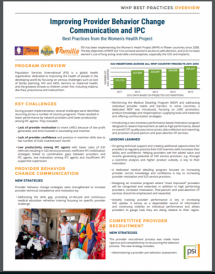Improving Provider Behavior Change Communication and IPC
During implementation of its Women’s Health Project, Population Services International (PSI) identified several challenges relating to provider behavior relating to IUDs.
These challenges resulted in lower performance by network providers and lower productivity among IPC agents.
They included:
- Lack of provider motivation to insert LARCs because of low profit generated, and time involved in counseling and insertion
- Lack of provider confidence and practice in insertion skills due to low number of IUDs inserted each month
- Low productivity among IPC agents with lower rates of IUD referrals resulting in IUD service provision; inefficient IPC mobilization strategies linked to coordination gaps between providers and IPC agents, low motivation among IPC agents and insufficient IPC supportive supervision
This brief discusses the strategies for improving provider behavior change and the lessons learned through this process.
Source: Population Services International
Date of Publication: June 29, 2021
SIMILIAR RESOURCES
Tools
Examples
- Improving the Uptake and Adherence of Iron Folic Acid Supplements among Pregnant and Lactating Women
- Crisis and Outbreak Communication Pandemic Flu and Other Disasters
- Digital and Social Media for Social and Behaviour Change Communication
- Behavioral Design for COVID-19 Response
- Behavioral Science Tips for Physical Distancing
- Behavior Change Communication Using Social Media: A Review
- Who Self-Cares Wins
- A Guide to WHO’s Guidance on COVID-19
- Barrier Analysis Questionnaires
- Changing Behavior to Improve People’s Lives

